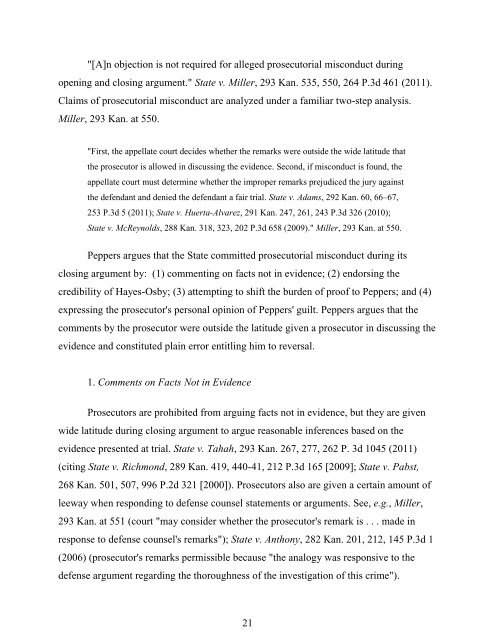Kansas Supreme Court - 101551 â State v. Peppers
Kansas Supreme Court - 101551 â State v. Peppers
Kansas Supreme Court - 101551 â State v. Peppers
You also want an ePaper? Increase the reach of your titles
YUMPU automatically turns print PDFs into web optimized ePapers that Google loves.
"[A]n objection is not required for alleged prosecutorial misconduct during<br />
opening and closing argument." <strong>State</strong> v. Miller, 293 Kan. 535, 550, 264 P.3d 461 (2011).<br />
Claims of prosecutorial misconduct are analyzed under a familiar two-step analysis.<br />
Miller, 293 Kan. at 550.<br />
"First, the appellate court decides whether the remarks were outside the wide latitude that<br />
the prosecutor is allowed in discussing the evidence. Second, if misconduct is found, the<br />
appellate court must determine whether the improper remarks prejudiced the jury against<br />
the defendant and denied the defendant a fair trial. <strong>State</strong> v. Adams, 292 Kan. 60, 66–67,<br />
253 P.3d 5 (2011); <strong>State</strong> v. Huerta-Alvarez, 291 Kan. 247, 261, 243 P.3d 326 (2010);<br />
<strong>State</strong> v. McReynolds, 288 Kan. 318, 323, 202 P.3d 658 (2009)." Miller, 293 Kan. at 550.<br />
<strong>Peppers</strong> argues that the <strong>State</strong> committed prosecutorial misconduct during its<br />
closing argument by: (1) commenting on facts not in evidence; (2) endorsing the<br />
credibility of Hayes-Osby; (3) attempting to shift the burden of proof to <strong>Peppers</strong>; and (4)<br />
expressing the prosecutor's personal opinion of <strong>Peppers</strong>' guilt. <strong>Peppers</strong> argues that the<br />
comments by the prosecutor were outside the latitude given a prosecutor in discussing the<br />
evidence and constituted plain error entitling him to reversal.<br />
1. Comments on Facts Not in Evidence<br />
Prosecutors are prohibited from arguing facts not in evidence, but they are given<br />
wide latitude during closing argument to argue reasonable inferences based on the<br />
evidence presented at trial. <strong>State</strong> v. Tahah, 293 Kan. 267, 277, 262 P. 3d 1045 (2011)<br />
(citing <strong>State</strong> v. Richmond, 289 Kan. 419, 440-41, 212 P.3d 165 [2009]; <strong>State</strong> v. Pabst,<br />
268 Kan. 501, 507, 996 P.2d 321 [2000]). Prosecutors also are given a certain amount of<br />
leeway when responding to defense counsel statements or arguments. See, e.g., Miller,<br />
293 Kan. at 551 (court "may consider whether the prosecutor's remark is . . . made in<br />
response to defense counsel's remarks"); <strong>State</strong> v. Anthony, 282 Kan. 201, 212, 145 P.3d 1<br />
(2006) (prosecutor's remarks permissible because "the analogy was responsive to the<br />
defense argument regarding the thoroughness of the investigation of this crime").<br />
21
















